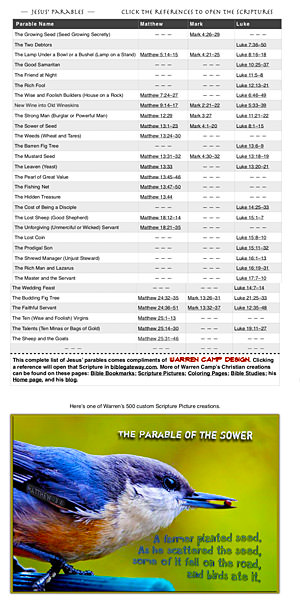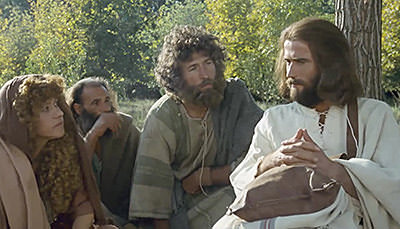The two parables are some of the shortest parables of Jesus. Both share the theme of the kingdom of heaven growing from small beginnings. while similar, the two have considerable differences as noted below.
— Preview —
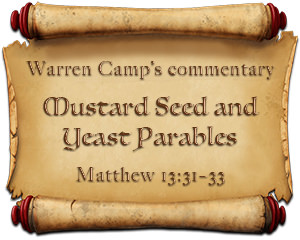
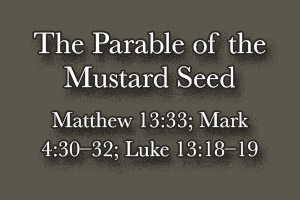
and
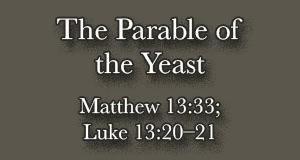
Click the list or the “bird” to enlarge and use Warren’s list of forty-four of Jesus’ parables (a PDF file with links to Scriptures).
Watch this popular JESUS Film clip about the Parable of the Mustard Seed titled "Teaching About Prayer and Faith."
par•a•ble [noun] a simple story used to illustrate the meaning of or a moral or spiritual lesson, as told by Jesus in the gospels
synonyms: allegory, moral story/tale, fable
Jesus’ Parables of the Mustard Seed and the Yeast
Matthew 13:31–33; Mark 4:30–32; Luke 13:18–21
In Matthew’s gospel, Jesus tells eight back-to-back parables. The first four were told to large crowds: the parables of the Sower, Seed, and Soil; the Weeds; and the Mustard Seed and the Yeast. He then left the crowd and went into a house to speak privately to his disciples, wherein he explained the Parable of the Weeds before telling them these four additional ones: the parables of the Hidden Treasure; the Valuable Pearl; the Fishing Net; and the Household Treasures. Mark and Luke also reiterate the Parables of the Mustard Seed and/or the Yeast parables. In every one, Jesus used genuine settings, characters, and ideas that applied familiarly to his listeners, so that he could easily reveal to them God’s loving aims, endeavors, and plans. This combination of back-to-back parables is found only in Matthew’s gospel.
The Parable of the Mustard Seed
Matthew 13:33; Mark 4:30–32; Luke 13:18–19
Found in the three synoptic gospels, the Parable of the Mustard Seed is perhaps Jesus’ most personal illustration of the kingdom of heaven. All three accounts are quite similar so I’ve decided to reference only Matthew’s account herein, however, I’ll provide the Mark and Luke links above for your comparison to Matthew’s rendering. Note too that while this parable is as tiny as a mustard seed, it’s nevertheless fully packed with wisdom.
This video clip comes compliments of Moving Works
Once again, Jesus began this next parable by saying, “The kingdom of heaven is like. . .” He was telling this parable to communicate what the kingdom of God is like, using a metaphor to which his audience would easily relate.
The Parable of the Mustard Seed
31He told them another parable: “The kingdom of heaven is like a mustard seed, which a man took and planted in his field. 32Though it is the smallest of all seeds, yet when it grows, it is the largest of garden plants and becomes a tree, so that the birds come and perch in its branches” (Matthew 13:31–32).

A mustard seed is 1 to 2
millimeters in diameter,
which is only about
1/64th of an inch!
Customarily, a mustard plant never grows beyond what one would call a bush; at its normal size it would be an unlikely place for birds to perch and nest. However, some mustard plants have been found to have developed into 20-foot-wide-and-tall trees. Jesus was describing a tree-like growth, originating from a tiny mustard seed, that was quite unnatural. Perhaps the language suggests that Jesus was referring to the Old Testament representation of the tree as an image of a great empire (see especially Ezekiel 17:23; 31:3–9; Daniel 4:10–12). This huge tree serves admirably to express the thought of a growth beyond expectation. Who would expect so tiny a seed to produce such a large herb, a monster in the garden?
To Jesus’ audience, the smallest known seed was a mustard seed, which can in fact grow to be a plant as large as a tree. Today in Jerusalem, depending on the season, full-grown mustard trees are often filled with birds that eat the trees’ small black seeds. That’s the backdrop of this parable that Jesus spoke to the crowd who knew well of the characteristics of the size of the mustard seed and its fully developed tree.
For those who heard Jesus’ mustard-seed message it would have been easy to understand. He told them that, although God’s kingdom may have started from small beginnings, it would have a most powerful outcome. Clearly, while the kingdom of heaven might have started small, because of God’s work developing it, there’d be no limit to its size and importance in today’s world.
Jesus’ preaching and teaching on the kingdom of heaven was a fresh approach for his listeners. He was giving them a new perspective of God’s love and care for his people, many of whom were unfamiliar with or had never heard such teachings. Alas, many people rejected it and him.
For that small group of a few men whom he called personally — albeit spiritually unskilled and unknowing people — although opposition to them became significant, they’d start a world-changing revolution by following him. So, Jesus spoke his mustard-seed revelation to many, declaring that, even though the truth about his kingdom seemed small and insignificant, it would nurture extensive growth beyond anyone’s estimation. As a result, the kingdoms of the world (represented by the abundance of birds perching in its branches) would receive shelter, sustenance, and safety, after accepting the truth of God’s kingdom and becoming one with it.
In retrospect, Jesus’ kingdom message started in a small town with a handful of disciples. Today, his kingdom message has been adopted by millions of people. That small seed of eleven followers developed into approximately 120 disciples whom the Holy Spirit baptized in the temple in Jerusalem. Thereafter, such growth cultivated itself into a gigantic collection of followers who, today, continue to represent the Church as an institution (see Luke 24:50–53).
A Hearty Way to Apply This Parable Today
It doesn’t matter how small and insignificant you feel about yourself and the gifts that the Spirit has given to you. Realize and appreciate that great things will likely happen to you as a result of the spiritual growth you’re destined to experience in your life. When you “irrigate and fertilize” those little seeds that Jesus has planted in you — by familiarizing yourself with God’s Word and following what he says in the Bible — you’ll become equipped to make smart decisions.
After all, great things develop from small beginnings. The tiny mustard seed will never stop growing. When Jesus — the King of his Kingdom — comes to rule powerfully on the earth, that seed will apparently have continued to grow for ever and ever. God expects great things from you because he’s made greatness a viable asset in your life’s collection of tools and resources.
The Parable of the Yeast
“He told them still another parable: “The kingdom of heaven is like yeast that a woman took and mixed into about sixty pounds (or about 27 kilograms) of flour until it worked all through the dough” (Matthew 13:33).
The Parable of the Yeast, also called the Parable of the Leaven, is one of several parables told by Jesus to illustrate what the kingdom of God is like. It follows immediately the Parable of the Mustard Seed (shown above) in Matthew's and Luke’s gospels, however, Mark’s includes only the Parable of the Mustard Seed.
This video clip comes compliments of CCO Youth
This parable is part of a pair, sharing the meaning of the preceding Parable of the Mustard Seed, namely the powerful growth of the kingdom of God from small beginnings. Literally, just a little yeast is enough to work through a large quantity of whole dough. Figuratively, yeast is used throughout the Old and New Testaments to represent the teachings of the Pharisees, Sadducees, and Herod. The final outcome is inevitable, once the natural process of growth has begun.
Jesus presented a controversial picture when he compared his kingdom of heaven to leaven. Many theologians, if not most, regard this as a beautiful picture of the kingdom of God working its way through the whole world. Yet, leaven is consistently used as a picture of sin and corruption (especially in the Passover narrative of Exodus 12:8, 12:15–20). Again, both the content and the context point towards this being a description of corruption in the kingdom community. Although leaven also symbolizes evil influences in the New Testament (as in Luke 12:1), it’s not obvious which interpretation we should give the symbol of yeast in this miniparable.
As with the Parable of the Lost Coin, this parable is part of a pair, in which the first parable describes Jesus’ work in terms of a man’s agricultural activities, and the second in terms of a woman’s domestic activities. Joel B. Green (an American New Testament scholar and theologian) writes that Jesus “asks people — male or female, privileged or peasant, it does not matter — to enter the domain of a first-century woman and household cook in order to gain perspective on the domain of God.”
A woman takes yeast (leaven) and mixes it into dough. Eventually, all of the dough becomes affected by leaven. Incidentally, the large quantity of flour that Jesus referred to may hint at a planned festive occasion, since bread that would be produced using 60 pounds or 27 kilograms of flour amounts to roughly a bushel, which equates to 100 loaves of bread, each weighing 1.5 pounds. That would have been much more dough than any normal woman would prepare; again, this quantity suggests a massive size or unnatural amount.
When we look at the phrase “took and mixed into the flour” (NIV), it appears unlikely that this is presented to be a picture of the church gradually influencing the whole world for good. Rather, viewing this parable in the context of increasing opposition to Jesus’ work, he announced that his kingdom community would also be threatened by corruption and impurity. The New Revised Standard Version translates the Greek more correctly that the NIV and other versions that have the woman “mixing” the yeast into the dough. According to the Greek, what the woman is doing here is hiding the leaven: The kingdom is like “leaven that a woman took and hid in the flour.” The woman was doing something mysterious or perplexing rather than in an up-front manner that could be controlled.
While we’ll never know if the connotation of the yeast suggests goodness or corruption, we need to learn what point Jesus is making in this miniparable.
Now it’s important to define “kingdom of heaven.” In his many kingdom parables, Jesus, speaking as the Messiah, referred directly to his heavenly domain. In our current age, the kingdom of heaven is spiritual; it exists within the hearts of believers (Luke 17:21). Eventually, his kingdom will be manifest physically; the Lord Jesus will then establish his throne on the earth (Revelation 11:15).
At least four things are to be learned from this parable regarding the working of the kingdom in the present age. Each lesson stems from the nature of yeast, which is defined as any of several yeasts of the genus Saccharomyces, used in brewing alcoholic beverages,as a leaven in baking breads, and in pharmacology as a source of vitamins and proteins. The living organisms in the leaven grow overnight; by morning, the entire quantity of dough will have been affected.
1. Size The kingdom of God may have begun small but it will increase in size and importance. Yeast, while microscopic in size, with only a little of it getting kneaded into bread dough, will, over time, spread through all the dough. In the same way, Jesus’ domain started in an obscure corner of Galilee, with only twelve men whom he called to follow him. Yet, his domain or kingdom has spread throughout the world and continues to increase in size.
2. Working Internally God’s kingdom exerts its influence from within, not from without. As yeast makes dough rise from within, God first changes the heart of a person so that internal change has external manifestations. We see the same internal effect of how the gospel influence cultures from within: Christians who live in a culture act as agents of change, slowly transforming that culture from within.
3. Cause and Effect The kingdom of God will have a comprehensive effect on its constituents. Just as yeast works until the dough has completely risen, the ultimate benefit of the kingdom of God will be worldwide (Psalm 72:19; Daniel 2:35). Prophet Habakkuk wrote: “The earth will be filled with the knowledge of the glory of the LORD, as the waters cover the sea” (Habakkuk 2:14).
4. The Gift of Grace Although the kingdom of God works invisibly, its effect becomes evident to everyone. Despite the fact that yeast does its job slowly, secretly, and silently, no one can deny its effect on bread. The same is true of the work of God’s gift of grace that he chooses to furnish us with and place in our hearts.
Yeast, by nature, is a small element that begins to grow; it effectively changes, grows, and develops what it contacts. When we accept Christ as our Lord, his grace grows in our hearts and changes us from the inside out. As yeast leavens bread, the gospel germinates and develops people’s lives throughout the world; they become new as a result of having been introduced to the kingdom of God that Jesus has brought to them (2 Corinthians 5:17).
In Conclusion The Parables of the Mustard Seed and the Yeast are twin parables that teach opposite aspects of the kingdom of heaven. The former is primarily positive but contains negative elements, while the latter is primarily negative but includes positive aspects. Like the Parable of the Mustard Seed, the kingdom begins in a small way; however, unlike the mustard seed, yeast doesn’t grow. Instead yeast transforms and changes the flour into dough. Using this analogy, Jesus taught that the kingdom of God is a small living agent that, once initiated, cannot stop increasing in power and size until it transforms and changes completely.
Jesus spoke all these things to the crowd in parables;
he did not say anything to them without using a parable (Matthew 13:34).


